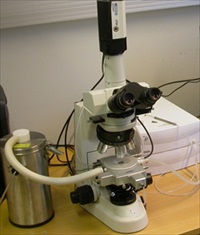Channels
Special Offers & Promotions
Scientists at the Geological Survey of Finland are using the MDSG600 stage for fluid inclusion microthermometry
Market leaders in temperature controlled microscopy, Linkam Scientific Instruments report on the use of their dynamic MDSG600 stage for geological research at the Geological Survey of Finland.
 Founded in 1886, the Geological Survey of Finland (GTK) was created to promote the systematic and sustainable use of the Earth's resources through the production and dissemination of geological information to society. The GTK is Finland's national geoscientific information centre and it participates actively in international research and project work, with the areas of focus falling into three main categories: mineral resources and exploration; energy supply and environment; and land use and construction. With its laboratories, archives and libraries, including the national archive for diamond drill core which houses over 3 million meters of bore hole sampling, together with the expertise of its staff, the GTK is considered a European centre of excellence.
Founded in 1886, the Geological Survey of Finland (GTK) was created to promote the systematic and sustainable use of the Earth's resources through the production and dissemination of geological information to society. The GTK is Finland's national geoscientific information centre and it participates actively in international research and project work, with the areas of focus falling into three main categories: mineral resources and exploration; energy supply and environment; and land use and construction. With its laboratories, archives and libraries, including the national archive for diamond drill core which houses over 3 million meters of bore hole sampling, together with the expertise of its staff, the GTK is considered a European centre of excellence.
Dr Ferenc Molnar and his team are using the MDSG600 stage from Linkam to help with this research. His group focuses on fluid inclusion microthermometry work with the aim of understanding the processes that lead to ore formation. He commented "fluid inclusion microthermometry work is essential in understanding geological processes leading to formation of hydrothermal ore deposits."
The Linkam MDSG600 is a motorized version of the THMSG600, arguably the most popular geology heating/freezing stage in the world. The sample is motorized in X and Y directions by precision micro-stepped motors that enable micron repeatable position resolution and recall. Using this feature, a sample can be mapped in order to quickly relocate positions of interest and carry out temperature controlled experiments significant to that point. Unrivalled accuracy and control of temperature from -196 to 600ºC enable the user to characterize fluid inclusions to better than 0.1ºC and hold a stability of 0.001ºC.
Dr Molnar added "the stage is important to this research as it allows us to understand fluid flow processes, fluid/rock interaction, mobilization and the precipitation processes of metals, and the formation of minerals during hydrothermal processes. The knowledge gained by that research helps to define geological models. The goal of this research is to allow us to find new ore deposits with economic value."
He noted that "one of the major benefits of the Linkam MDSG600 is the motorized stage which helps to map out fluid inclusion contents of mineral chips. Also, the high thermal stability together with the opportunity of fast changes of temperature makes an extremely detailed and precise microthermometric analysis possible."
more about temperature-controlled microscopy
Media Partners


